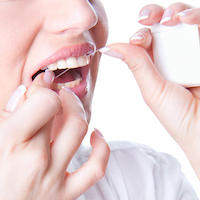Floss: Who’s the Boss?
August 23rd, 2016Patients have been asking us about the “flossing fraud” stories recently making their way across cyberspace, on television and in print media. For those of you who missed the headlines, an Associated Press (AP) report looked at flossing over the past decade and determined that the evidence for flossing was “weak,” and “very unreliable.”
 The Pennsylvania Center for Dental Implants and Periodontics’s position on flossing hasn’t changed (and neither has that of most dental professionals across the planet). While we can’t study flossing (done in the privacy of the home) the same way we study areas like periodontal disease and surgical outcomes, the simple fact is that flossing has clearly been demonstrated as the best way to reduce interproximal (the surfaces of adjacent teeth that touch each other) plaque accumulation— one of the most common areas to develop tooth decay. When we evaluate our patient’s periodontal status, the interproximal areas are where we most commonly see bone loss caused by periodontal disease.
The Pennsylvania Center for Dental Implants and Periodontics’s position on flossing hasn’t changed (and neither has that of most dental professionals across the planet). While we can’t study flossing (done in the privacy of the home) the same way we study areas like periodontal disease and surgical outcomes, the simple fact is that flossing has clearly been demonstrated as the best way to reduce interproximal (the surfaces of adjacent teeth that touch each other) plaque accumulation— one of the most common areas to develop tooth decay. When we evaluate our patient’s periodontal status, the interproximal areas are where we most commonly see bone loss caused by periodontal disease.
Bottom line: Flossing your teeth isn’t exactly at the top of everyone’s favorite daily routines but we’d like you to continue doing it. The American Academy of Periodontology recently issued a statement which recommends daily flossing along with brushing teeth twice a day. They say that “the accumulation of plaque bacteria beneath the gum line may cause an inflammatory response which ultimately leads to gingivitis, a mild form of periodontal disease. If left untreated, periodontal disease can worsen, leading to tooth loss and increased risk for other systemic disease such as diabetes and heart disease.”
Still thinking of tossing the floss? Please think again!
